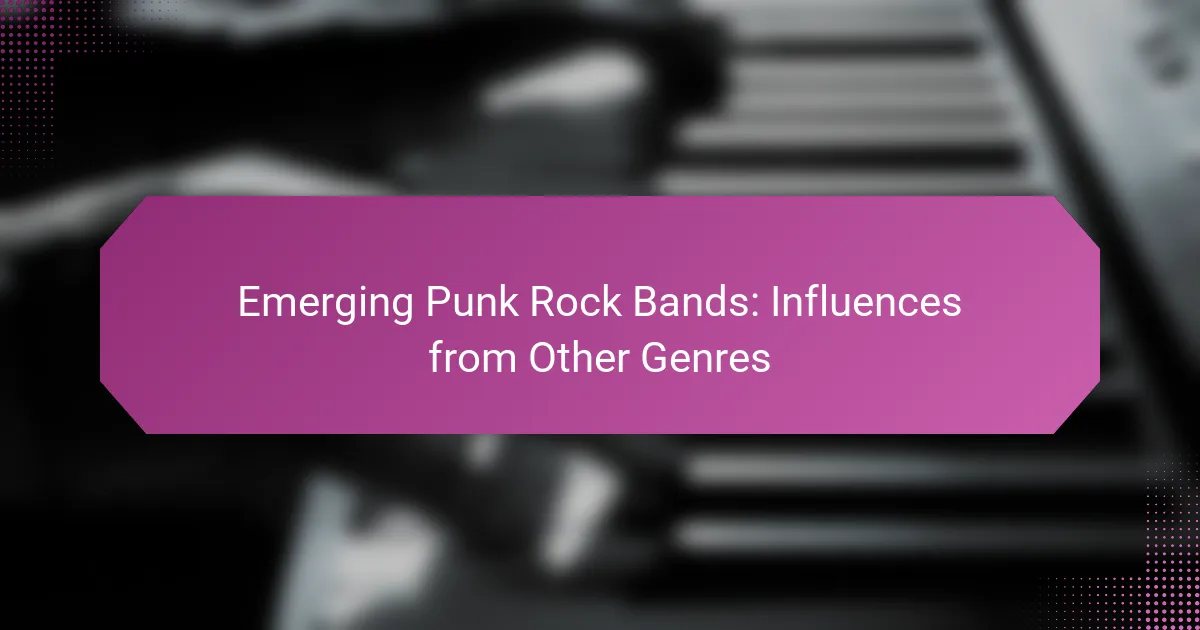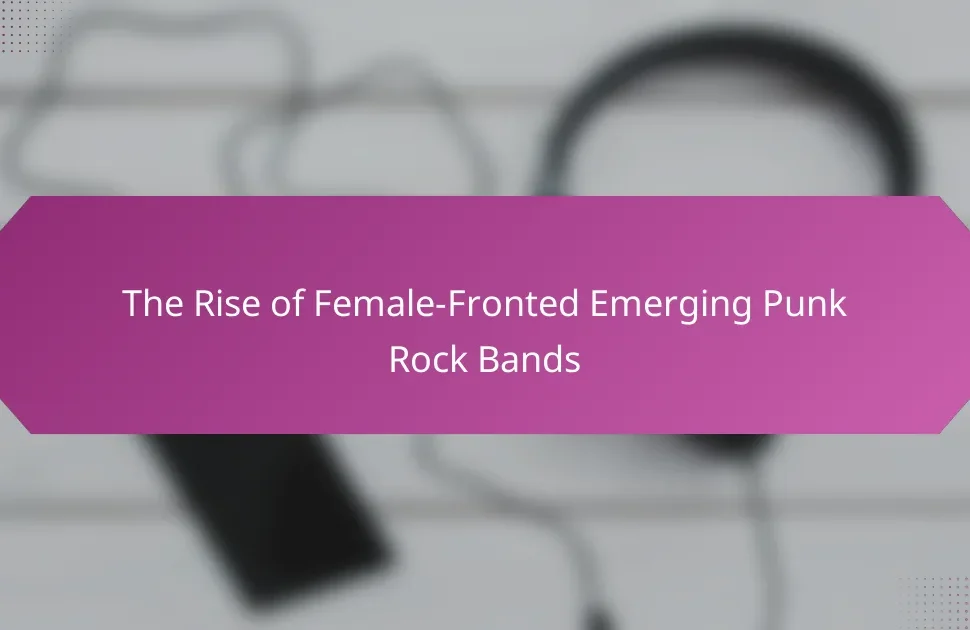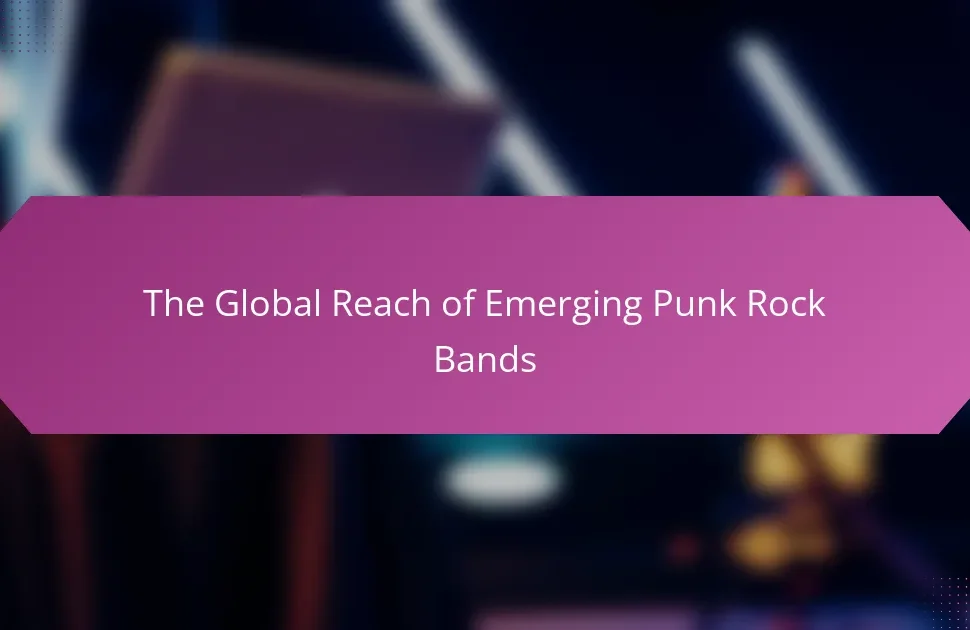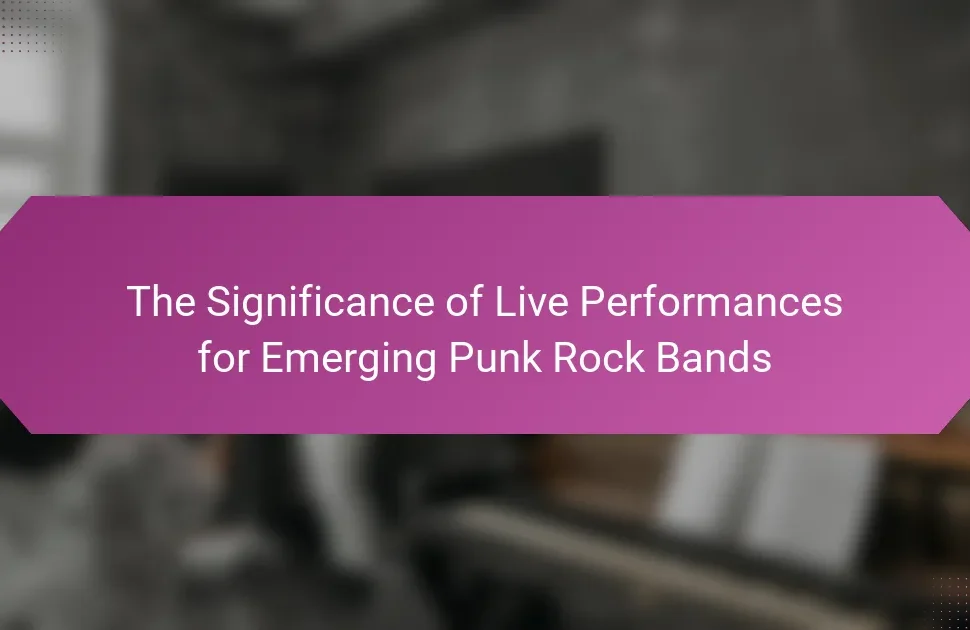Emerging punk rock bands are redefining their sound by incorporating influences from various genres. They blend elements from pop, metal, and hip-hop to create unique musical identities. These bands explore themes of rebellion and social commentary while navigating the challenges of maintaining authenticity. Cultural context and innovative production techniques further shape their diverse expressions, appealing to a wider audience.
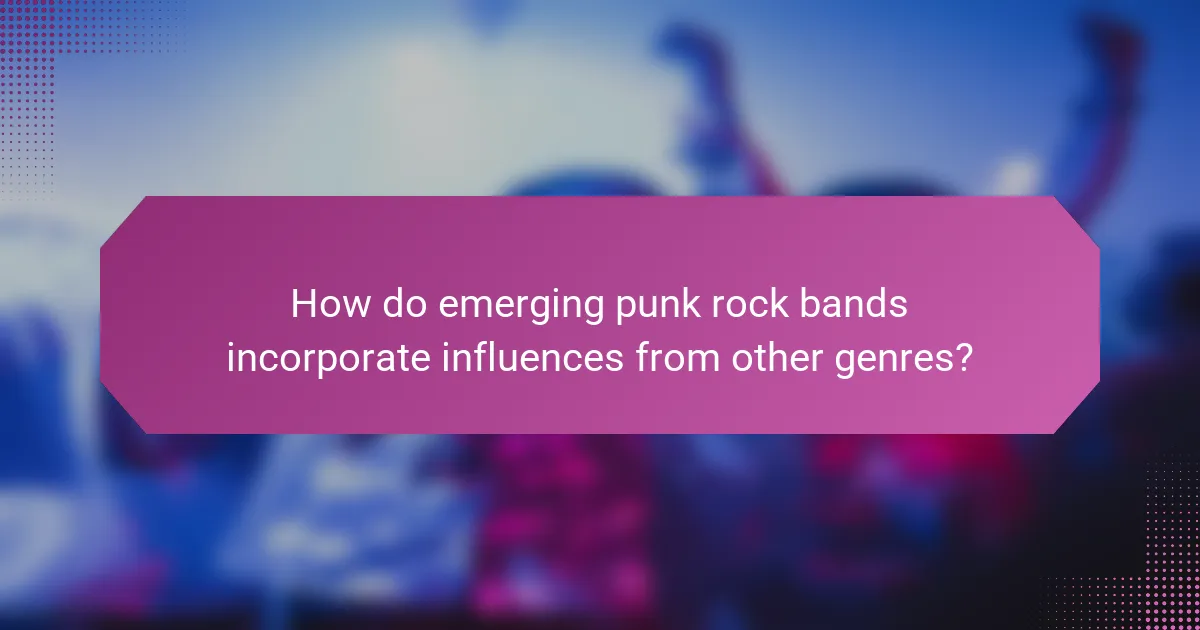
How do emerging punk rock bands incorporate influences from other genres?
Emerging punk rock bands blend influences from various genres to create unique sounds. They often incorporate elements from pop, metal, and reggae, enhancing their musical diversity. For example, bands like PUP and Refused integrate melodic hooks and complex rhythms, drawing from pop-punk and hardcore respectively. This fusion allows them to appeal to broader audiences while maintaining punk’s raw energy. Additionally, the use of electronic music elements has become more common, reflecting contemporary trends and expanding their sonic palette.
What genres are most commonly blended with punk rock?
Punk rock commonly blends with genres like pop, metal, and reggae. These influences shape the sound and style of emerging punk rock bands. For example, pop punk incorporates catchy melodies, while metal influences add heavier guitar riffs. Reggae elements can introduce a distinctive rhythm, creating a diverse musical landscape within punk rock.
How do musical elements from other genres reshape punk rock sounds?
Emerging punk rock bands are increasingly blending elements from various genres, reshaping their sound. Bands incorporate influences from genres like hip-hop, metal, and electronic music, creating a diverse sonic palette. For example, the use of rap rhythms and beats adds a contemporary edge to traditional punk. Additionally, metal’s heavy guitar riffs contribute to a more aggressive sound, attracting a wider audience. This fusion not only revitalizes punk rock but also reflects the evolving musical landscape, demonstrating how genre boundaries can be transcended.
Which emerging bands exemplify genre fusion in punk rock?
Emerging punk rock bands increasingly blend influences from genres like pop, metal, and hip-hop. Bands such as Amyl and the Sniffers, IDLES, and Fontaines D.C. exemplify this genre fusion.
Amyl and the Sniffers incorporate elements of garage rock and punk, creating a raw sound that appeals to diverse audiences. IDLES merge punk with post-punk and noise rock, addressing social issues through their music. Fontaines D.C. blend traditional punk with Irish folk influences, resulting in a unique sound that resonates with their cultural background.
These bands showcase how genre fusion enriches punk rock, attracting new listeners while maintaining punk’s rebellious spirit.
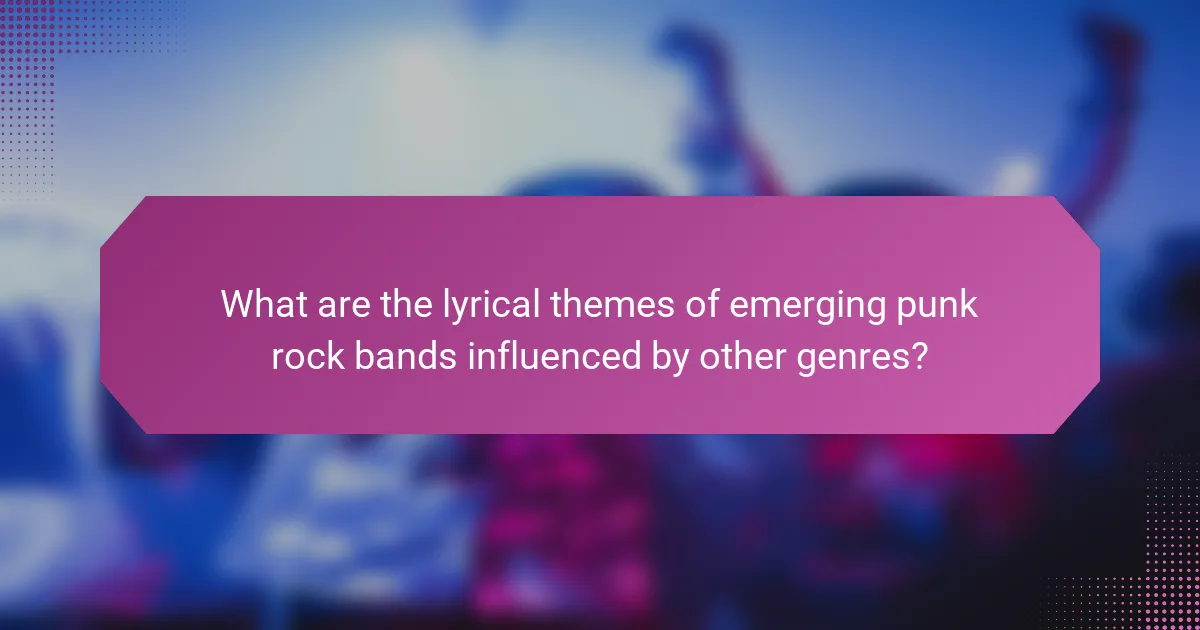
What are the lyrical themes of emerging punk rock bands influenced by other genres?
Emerging punk rock bands influenced by other genres often explore themes of rebellion, identity, and social commentary. These bands incorporate elements from genres like hip-hop, pop, and metal, creating a fusion that resonates with diverse audiences.
Lyrical themes frequently address personal struggles, political issues, and cultural critiques. For instance, some bands draw from hip-hop’s storytelling techniques to convey their messages more powerfully. The blending of styles allows for unique expressions, making their lyrics stand out in the punk scene.
Additionally, the incorporation of melodic elements from pop music can soften punk’s traditionally aggressive sound, attracting a broader listener base. This evolution reflects a shift in punk rock’s narrative, embracing a more inclusive and varied approach to songwriting.
Overall, the thematic landscape of emerging punk rock bands showcases a rich tapestry of influences, reflecting contemporary issues and personal experiences while maintaining punk’s core ethos of defiance.
How do genre influences alter the narrative style in punk rock lyrics?
Genre influences significantly alter the narrative style in punk rock lyrics by introducing diverse themes and perspectives. Punk rock often incorporates elements from genres like reggae, hip-hop, and folk, which enrich the storytelling and emotional depth. For example, reggae’s rhythm can add a laid-back vibe, while hip-hop’s lyrical complexity enhances wordplay. The fusion of these genres allows emerging punk bands to express unique social and political messages, appealing to a broader audience. Additionally, incorporating folk elements can evoke nostalgia and personal storytelling, further diversifying the narrative style.
Which lyrical topics resonate with audiences in 2025?
Emerging punk rock bands in 2025 resonate with themes of social justice, mental health, and environmental activism. These topics reflect current societal concerns, allowing bands to connect deeply with audiences. The fusion of punk with genres like hip-hop and electronic music has led to innovative sounds that amplify these messages. Unique lyrical approaches, such as storytelling and personal narratives, further enhance engagement, making the music relatable and impactful.
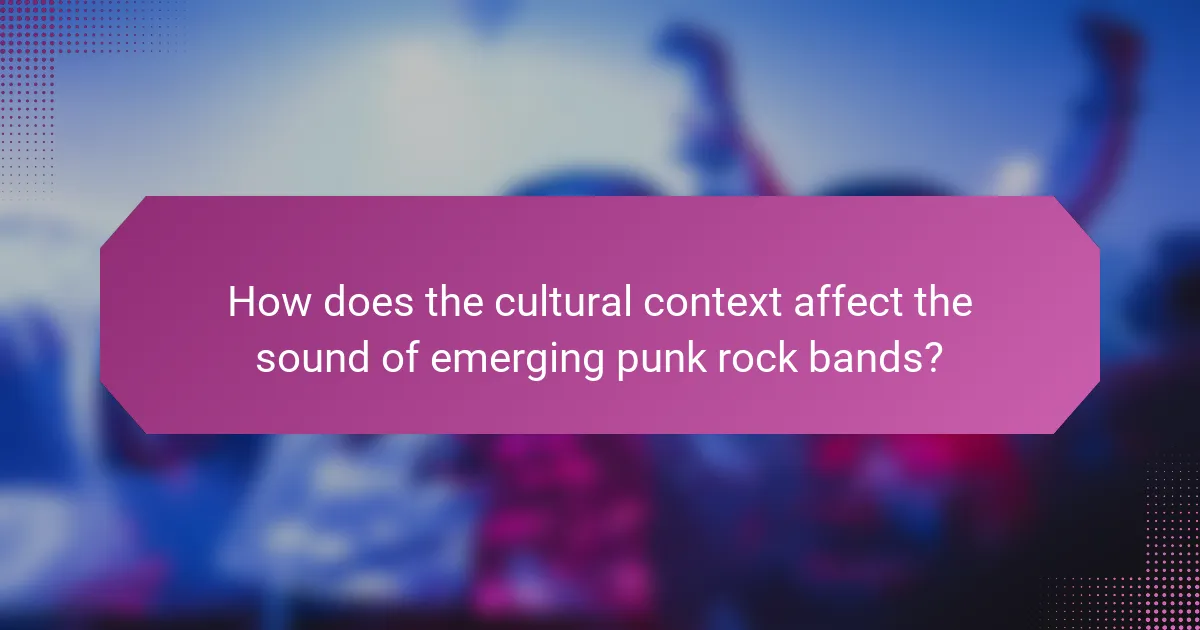
How does the cultural context affect the sound of emerging punk rock bands?
Cultural context significantly shapes the sound of emerging punk rock bands. Influences from local music scenes, historical events, and societal issues contribute to their unique sound.
Local music scenes often inspire punk rock bands, blending genres like reggae or hip-hop. For example, bands in regions with strong folk traditions may incorporate acoustic elements. Historical events, such as political movements, also influence lyrical themes and musical style.
Societal issues, such as economic struggles or social justice, drive the raw energy and message in punk rock. This connection to cultural context creates a distinct identity for each band, reflecting their environment. As a result, emerging punk rock bands offer diverse sounds that resonate with their communities.
What role does regional identity play in shaping musical influences?
Regional identity significantly shapes musical influences by embedding cultural nuances into emerging punk rock bands. Local traditions, dialects, and social issues inform their sound and lyrical content. For instance, bands from urban areas often incorporate elements of hip-hop or electronic music, reflecting their environment. Additionally, regional history can inspire themes in their music, creating a unique identity that resonates with audiences. This blend of influences allows punk rock to evolve while retaining its rebellious spirit, making it a dynamic genre.
How do social movements impact the evolution of punk rock themes?
Social movements significantly shape punk rock themes by introducing social justice narratives and diverse influences. Punk rock has evolved to reflect issues like inequality and resistance, drawing from genres such as reggae and hip-hop. Emerging bands often blend these influences, creating unique sounds that resonate with contemporary struggles. This fusion highlights punk’s adaptability and its role as a voice for marginalized communities, reinforcing its relevance in modern music culture.

What are the production techniques used by emerging punk rock bands?
Emerging punk rock bands often use diverse production techniques influenced by various genres. These techniques include lo-fi recording methods, which create raw sound, and layering instruments to enhance texture. Bands frequently incorporate elements from genres like pop, metal, and hip-hop, blending styles to create unique sonic identities. Digital production tools allow for experimentation with effects and samples, further diversifying their sound. This fusion of influences helps emerging bands stand out in a crowded music landscape.
How do genre influences affect recording and mixing styles?
Emerging punk rock bands often blend influences from various genres, affecting their recording and mixing styles. Genres like metal, pop, and hip-hop introduce diverse rhythms, instrumentation, and production techniques. For instance, punk rock’s raw energy can be enhanced by the polished sound of pop, creating a unique sonic identity. Additionally, the aggressive tones of metal can influence guitar mixing, leading to heavier soundscapes. As a result, these cross-genre influences contribute to a dynamic evolution in punk rock, allowing bands to experiment and stand out in a competitive music landscape.
Which technologies are shaping the sound of modern punk rock?
Emerging punk rock bands are increasingly influenced by genres like electronic, hip-hop, and pop. This fusion incorporates diverse sounds and production techniques, reshaping punk’s traditional boundaries. For instance, bands like Amyl and the Sniffers blend punk with elements of garage rock and 80s pop. Additionally, the use of digital production tools allows for innovative soundscapes that enhance the punk aesthetic. As a result, modern punk rock is evolving, showcasing a rich tapestry of influences that resonate with wider audiences.
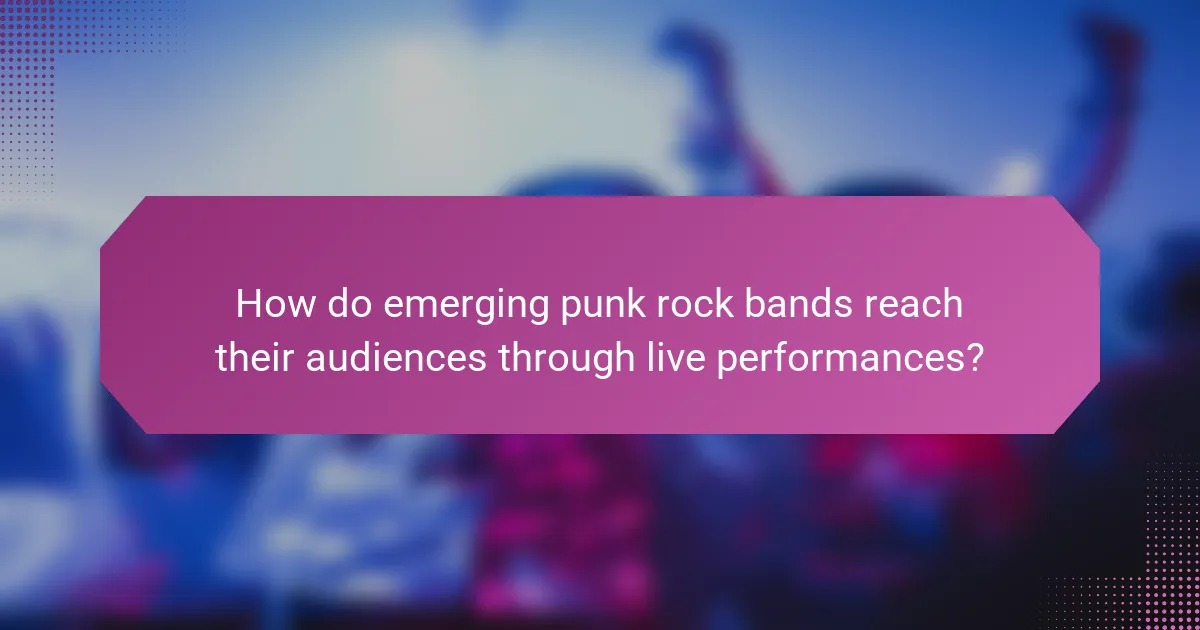
How do emerging punk rock bands reach their audiences through live performances?
Emerging punk rock bands reach their audiences through live performances by blending influences from various genres. They often incorporate elements from rock, pop, and even electronic music to enhance their sound and attract diverse crowds.
These bands utilize high-energy shows to create an engaging atmosphere that resonates with fans. They often perform in intimate venues, fostering a sense of community and connection. Social media plays a crucial role in promoting these events, allowing bands to reach wider audiences quickly.
Collaboration with artists from different genres can also expand their reach. Unique attributes, such as innovative stage setups and interactive performances, distinguish them from established acts. As a result, emerging punk rock bands effectively engage audiences and build loyal followings through their live shows.
What unique elements do these bands incorporate into their shows?
Emerging punk rock bands incorporate unique elements like diverse musical influences, theatrical performances, and interactive audience engagement. These bands blend genres such as pop, metal, and hip-hop, creating a fresh sound. Theatrical elements, including costumes and stage design, enhance the visual experience. Audience participation, such as call-and-response segments, fosters a communal atmosphere.
How does genre blending affect audience engagement?
Genre blending significantly enhances audience engagement by creating diverse soundscapes that attract a wider listener base. Emerging punk rock bands incorporate elements from genres like hip-hop, electronic, and metal, leading to innovative music that resonates with various demographics. This fusion fosters a sense of community among fans who appreciate multiple genres, increasing concert attendance and streaming numbers. As a result, genre-blending acts can cultivate a loyal following and enhance their marketability in the competitive music industry.
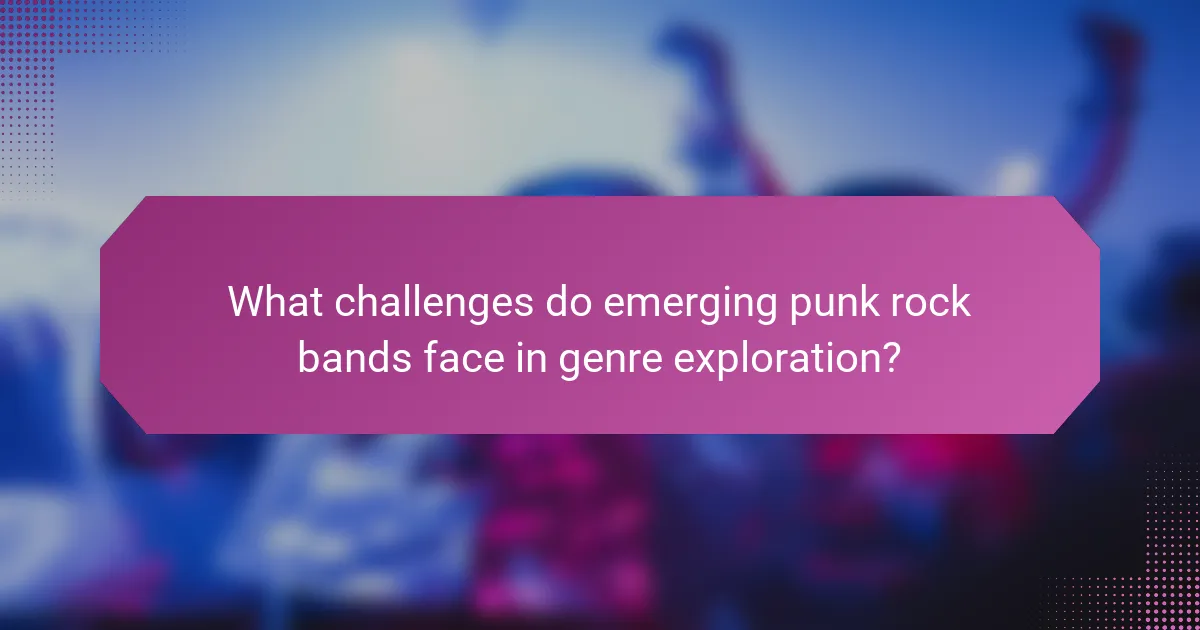
What challenges do emerging punk rock bands face in genre exploration?
Emerging punk rock bands face challenges in genre exploration due to various influences from other music styles. These bands often struggle to maintain their punk identity while integrating elements from genres like pop, metal, and hip-hop.
One challenge is the pressure to commercialize their sound, which can dilute their original punk ethos. As a result, some bands may prioritize marketability over authenticity. Additionally, the blending of genres can lead to confusion among fans, who may have specific expectations of what punk rock should represent.
Emerging bands also encounter difficulties in finding their unique voice amidst a saturated music scene. This quest for originality can be hindered by the overwhelming influence of popular trends. Furthermore, the rapid evolution of music technology complicates their ability to create a distinct sound that resonates with audiences.
Lastly, navigating the balance between innovation and tradition remains a significant challenge. Bands must decide how much to experiment while still honoring the roots of punk rock, which can create tension within the creative process.
How do these challenges differ across various regions?
Challenges faced by emerging punk rock bands differ significantly across regions due to cultural, economic, and musical influences. In North America, bands often struggle with commercialization and market saturation. European bands, however, may face challenges related to diverse musical heritage and varying local scenes. In Asia, emerging bands often contend with strict regulations and limited access to venues. Each region’s unique attributes shape the punk rock landscape, influencing how bands draw from other genres for inspiration.
What strategies can bands use to overcome these obstacles?
Emerging punk rock bands can overcome obstacles by diversifying their influences and collaborating across genres. They should explore blending elements from pop, metal, or indie rock to create unique sounds. This approach can attract wider audiences and enhance their musical identity. Additionally, leveraging social media for promotion and engaging with fans directly can build a loyal following. Establishing connections with established artists for mentorship can also provide valuable insights and opportunities for growth.

What best practices can emerging punk rock bands adopt for successful genre fusion?
Emerging punk rock bands can successfully fuse genres by embracing collaboration, experimenting with diverse sounds, and maintaining authenticity. Collaboration with artists from different genres introduces fresh perspectives, enhancing creativity. Experimentation with elements like tempo, instrumentation, and lyrical themes allows bands to innovate while still honoring punk roots. Authenticity ensures that the fusion resonates with both the band’s identity and the audience’s expectations, creating a unique sound that stands out.
How can bands effectively blend genres while maintaining their punk identity?
Bands can effectively blend genres while maintaining their punk identity by incorporating diverse influences without losing their core ethos. They often draw from genres like reggae, metal, or hip-hop, infusing these elements into their music. This approach allows them to explore new sounds while staying true to punk’s rebellious spirit.
Emerging punk rock bands frequently utilize unique attributes such as unconventional song structures and varied instrumentation. For example, a band might incorporate a reggae rhythm in a punk song, creating a fresh sound that still resonates with punk’s energy. This fusion can attract a wider audience while preserving the band’s identity.
Maintaining lyrical authenticity is crucial. Bands should focus on themes related to social issues, personal struggles, or anti-establishment sentiments, which are core to punk. This ensures that even with genre blending, the message remains aligned with punk values.
Finally, collaboration with artists from other genres can introduce new perspectives and techniques, enriching the band’s musical palette. By embracing these influences, bands can innovate while remaining grounded in their punk roots.
What common mistakes should bands avoid in genre experimentation?
Emerging punk rock bands should avoid losing their core identity while experimenting with other genres. Common mistakes include overcomplicating sound, neglecting lyrical authenticity, and disregarding audience expectations. Bands should remain true to punk’s rebellious spirit while blending influences. This balance can lead to innovative music without alienating their fan base.
